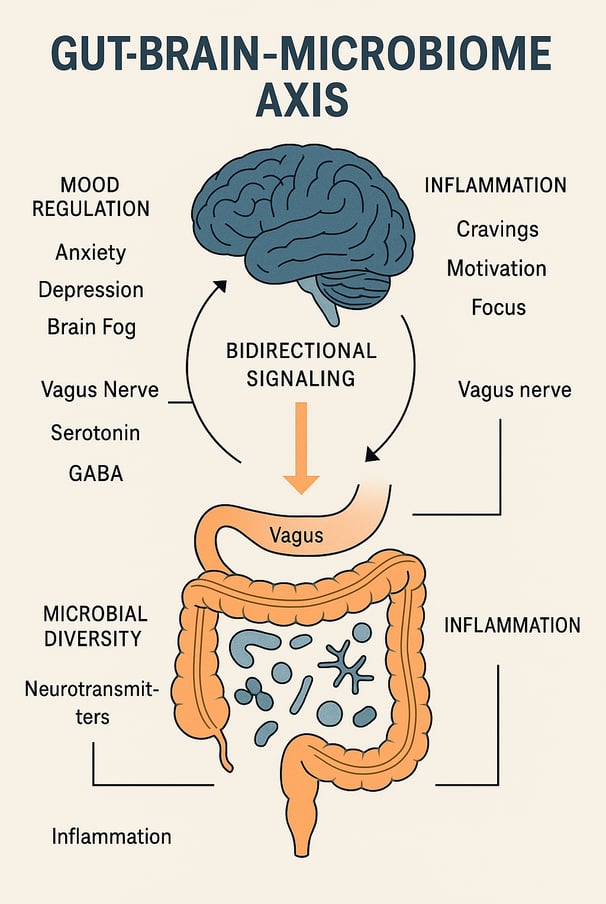Level 1: Core Principles of the
Gut–Brain–Microbiome (GBM) Axis
The Gut-Brain-Microbiome (GBM) Axis is a powerful, bidirectional communication network connecting the gut, brain, and microbiome.
Your gut isn't just digesting food—it's sending signals to your brain, influencing mood, memory, sleep, anxiety, and overall mental health. This complex relationship functions through neural, immune, endocrine, and metabolic pathways, all deeply shaped by the trillions of microbes living in your digestive system.
When the gut is out of balance, the mind can suffer.
But when it’s nourished—through movement, nutrition, and stress reduction—it becomes a center of clarity, resilience, and emotional stability.
DREAM recognizes the GBM Axis as essential to mental wellness.
That’s why we treat healing as both emotional and biological.
What happens in the gut doesn’t stay in the gut.
It becomes you.
Level 1: Core Principles of the GBM Axis
1. What is the GBM Axis?
The Gut-Brain-Microbiome (GBM) Axis is a bidirectional communication network linking the gut microbiome, brain, and gastrointestinal (GI) tract.
It influences mental health, mood, cognition, and overall well-being through multiple biological pathways.
2. Key Pathways of GBM Communication
✔ Neurotransmitter Modulation: The gut microbiota produces and regulates neurotransmitters like serotonin, dopamine, and GABA, affecting mood and cognition.
✔ Neuroinflammation & Immune Signaling: Gut bacteria influence inflammation, impacting stress responses, anxiety, and depression.
✔ Vagus Nerve Connection: Direct neural communication from the gut to the brain regulates mood, digestion, and stress resilience.
✔ Short-Chain Fatty Acids (SCFAs): Microbiota ferment fiber, producing SCFAs (like butyrate) that improve brain function and reduce inflammation.
✔ Hormonal Regulation: The gut influences cortisol (stress hormone) and insulin levels, affecting stress and metabolism.
3. How the GBM Axis Affects Mental Health
Anxiety & Depression: Imbalances in gut bacteria are linked to increased neuroinflammation and reduced serotonin production.
Cognitive Function: A healthy microbiome improves memory, learning, and neuroplasticity.
Stress & Resilience: A diverse microbiome enhances the body's ability to regulate stress responses.
4. Common Disruptors of GBM Health
❌ Poor Diet: Processed foods, excess sugar, and low fiber harm gut bacteria.
❌ Chronic Stress: Disrupts gut motility, alters microbiota balance, and increases inflammation.
❌ Antibiotic Overuse: Kills beneficial gut bacteria, reducing microbial diversity.
❌ Sleep Deprivation: Alters gut flora, increasing risk of anxiety and depression.
❌ Sedentary Lifestyle: Reduces microbiome diversity and gut motility.
5. Actions & Behaviors to Support GBM Health
✅ Eat Prebiotics & Probiotics:
Probiotics (yogurt, kimchi, kefir) introduce beneficial bacteria.
Prebiotics (onions, garlic, bananas, fiber-rich foods) feed good bacteria.
✅ Manage Stress Effectively:
Practice breathwork, meditation, and mindfulness.
Engage in vagus nerve-stimulating activities (humming, cold exposure).
✅ Prioritize Sleep:
Maintain consistent sleep-wake cycles.
Avoid late-night eating and screen exposure before bed.
✅ Engage in Regular Physical Activity:
Moderate exercise enhances gut microbiota diversity.
Resistance training and aerobic activity improve gut-brain signaling.
✅ Hydrate & Avoid Gut Irritants:
Drink plenty of water to support digestion.
Reduce alcohol, artificial sweeteners, and processed foods.


© 2025. DREAMHEALER.ORG All rights reserved.
